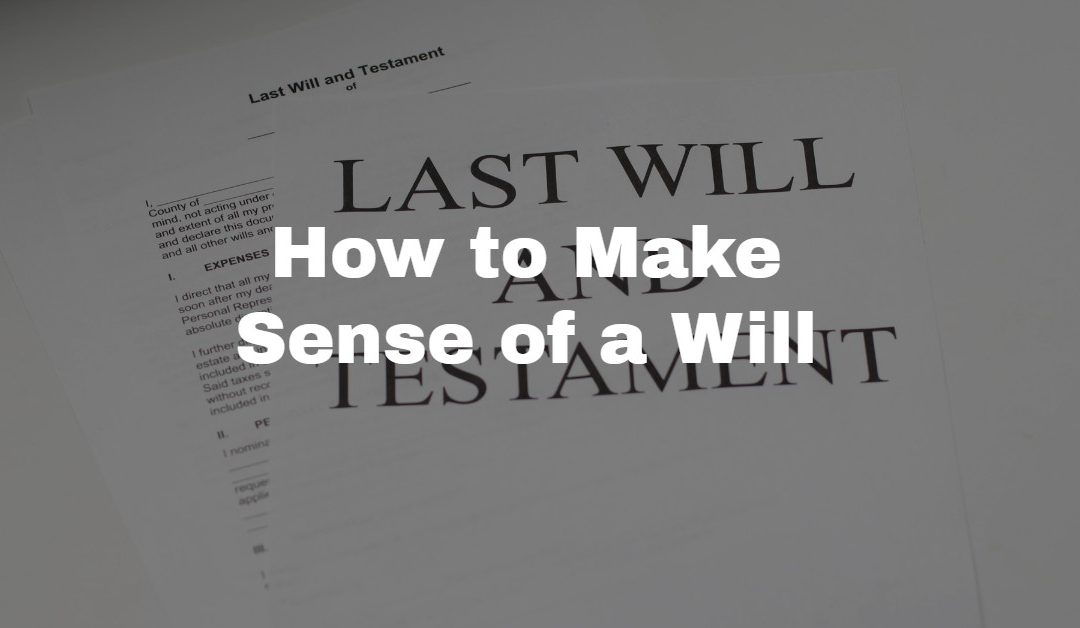When a loved one passes away, the first thing many family members do is search for a Will. If one is located, the family may gather and read the Will to see how their loved one wanted their assets distributed. Most often, though, there is not a formal will reading, and the executor takes of filing the Will and notifying everyone of their inheritance.
The idea of a Will may be a simple one, but there are a lot of moving parts contained in a Will. Some of the language may be difficult to understand. This article Will explain how to make sense of a Will.
What Makes a Will Valid?
Generally, in order for a Will to be legally binding, it must meet three requirements. The Will must be in writing, signed and dated by the person who made it (or it must have been signed by someone under the direction of the person making a Will), and signed by witnesses.
And in NC, you’ll want to have a self-proving affidavit attached to the Will. Without that, the witnesses will likely need to be found to affirm that they were the witnesses to the Will. If the Will seems to have been properly signed and witnessed, chances are the Will is valid. There is no responsibility to further research the circumstances of the Will’s signing unless someone suggests there is a problem with the Will.
Currently, most Wills are typed on a computer and printed out; however, a Will can also be completely handwritten as long as the signature and witnessing requirements are met. There are additional options for proving the validity of a handwritten will if it is written entirely in the handwriting of the person.
You can learn more about that here. A mix of computer-generated printing and handwriting is where this becomes legally troublesome. If something is crossed out on typed document and handwriting replaces it, it becomes impossible to know who made the change or to tell whether the change was made before or after the document was signed.
Often, a marked out provision will be given effect, as that indicates the destruction of a provision which does not require the will formalities to be met, but when someone writes something in its place, if that does not meet the formalities of a Will signing/witnessing, then it may not be given effect, which then will likely cause unintended consequences.
As a protective measure against fraud, almost all states require two witnesses as well as the Will-maker to sign the Will. Witnesses must watch the person who wrote the Will (also known as the “testator”) sign the Will and then sign the Will themselves. Witnesses are not required to read the Will. They do need to be made aware that the document they watched the testator sign is a Will.
As for the age of the witnesses, the general rule is that witnesses must be at least 18 years of age. In most states, a person who has the potential to inherit property under a Will is not allowed to be a witness to it. In NC, a beneficiary or a beneficiary’s spouse could be a witness, but the provisions pertaining to that beneficiary will not be given effect. It is possible to salvage that situation, though, if there are a sufficient number of additional disinterested witnesses.
Reading the Will
After proving that the Will is valid, it is time to read the Will. Many Wills are written with numerous legal terms which may be difficult to understand. It is common for Wills to begin with the testator’s information about their family – if they are married, their spouse’s name, and the names of their children or grandchildren. These statements are made to show that the testator made the Will with their close family members in mind.
The portion naming the executor is one of the most important parts of the Will. Normally, the Will names an executor and one to two alternates who would take over in the case that the original named executor declines to serve.
Some Wills do not state who is to serve as an executor. In this case, one person may be elected as executor or all persons mentioned in the document may elect to share the job as co-executors. If the testator named their spouse as the executor and later divorced, the law in most states revokes the nomination. The alternate executor would serve instead. In the rare case that no executor is named or no one named in the Will can serve, the court Will appoint someone just as they would if there was no Will present. This person is called “Administrator CTA.”

Specific gift clauses leave specific gifts to specific beneficiaries. Many Wills do not contain specific gift clauses. They leave everything to one person or to several people to share in equal parts. Other Wills make some specific gifts and leave everything else to one or more beneficiaries.
Another type of gift left to beneficiaries in a Will is called gift of personal effects or personal property. These gifts normally lump together not-so-valuable items into one group. If one person or group inherits everything, there is no need to worry about what items belong in this category. Courts commonly refer to the term “personal effects” to mean an item that one wears or carries or that has some “intimate relation” to that person. The term “personal property” is defined in broader terms to mean all property that is not real estate.
A Will has no effect on any assets that go directly to the beneficiary outside of the Will. An example of this is a retirement account that the deceased person named a beneficiary for. Any property that a state law provides that a surviving spouse or other relative can claim also falls outside of the Will. Other common examples of property that is not included in Wills are life insurance proceeds, property held in joint tenancy, property held in a trust, funds in a payable-on-death (POD) bank account, and stocks or other securities held in a transfer-on-death (TOD) account.
A gift of a certain amount of money that does not mention a specific source is called a general bequest or legacy. The executor is not allowed to use funds left to another beneficiary to satisfy a gift of money. The money must come from any cash that is part of the residuary estate. Basically, this includes any property the Will does not specifically mention. If there are not enough funds in the residuary estate to provide for the monetary gifts in the Will, the executor gets the funds by selling property from the residuary estate if possible. The executor would not sell any property that has been left to another beneficiary specifically.

The residue may include property that was specifically left to someone but could not be given for some reason. The residuary estate does not include property that cannot be touched in a Will as discussed earlier. If the Will has no clauses for specific gifts, the residuary clause disposes of everything that is subject to the Will.
If the testator left children under the age of 18, and there is no surviving parent that has the ability to raise them, there may be a clause that names the “personal guardian” for these children. If a guardian is needed, the court Will likely appoint the person named in the Will unless the court finds a serious issue with that person. The Will may also name a “property guardian” for the children. The person in this role will be responsible for managing the property that the children inherit unless another arrangement is stated in the Will. This person may be referred to as a conservator in many states. In NC, this person is referred to as a “guardian of the estate for a minor.”
Another clause, which could be found in the Will, is a clause that sets up a trust to take effect at the testator’s death. A trust is a document under which one person controls and manages property for another. Trusts created by Wills are called “testamentary trusts”. The most common use of a trust is set up by parents for their young children. If the parents die while the child is still young, a trustee will manage the property the child inherited until the child is older. Wills will generally set out the terms of the trust. The trustee is the person who will be in charge of managing and distributing the trust assets.
Sometimes a person will create a separate living trust to avoid probate. If this is the case, the Will may include a “pour-over” clause. This clause directs that some or all assets that pass through the Will are to be automatically put into the trust. Often, people who create pour-over Wills intend to use them for property they did not transfer into their trust. The executor will transfer these items into the trust instead of to individuals. The trustee will then distribute them based on the terms of the trust. This is a great tool to maintain privacy.
Another part of the executor’s job is to pay debts for the estate. Typically these debts include expenses for last illnesses, funeral costs, and taxes. These debts must be paid from estate assets. The Will may state a certain source of funds that should be used for paying these debts. If there is not enough money to pay all of the debts, the state’s laws will determine which debts should be paid. If there is enough money in the estate to pay debts and the Will does not state which assets to use to pay the debts, it is up to the executor to decide. Money in bank accounts or money market accounts are commonly used to pay debts owed by the estate.
Simultaneous Death
If you ever face the unusual situation of simultaneous death, you will need to check the Will to see if there is a simultaneous death clause. This clause sets out who gets what if the deaths were simultaneous, or if the deaths were so close in time to know who died first.
Most simultaneous death clauses states that the maker of the Will is deemed to survive the other person, so the property will not pass to that person. This ensures that the property passes under the deceased person’s Will. If the Will does not have this clause, the state’s law will determine the outcome of this situation. In NC, there’s a requirement to survive by 120 hours to take under a Will, unless the Will says otherwise, and it is not uncommon to change that requirement to 30, 90, or even 180 days.
Gifts to Groups of People
It is common for Wills to contain statements leaving property “to my children” or “to my grandchildren”. While it may be clear to the Will-maker, this may cause confusion when it comes time to interpret the Will, particularly with identifying who makes up the class of people referenced. If the beneficiaries are listed by name, it may or may not be a group gift and will depend on the wording of the Will, which may include Latin or legal phrases to describe the distribution plan intended. If you are not sure who is included under a group gift, it is your job or the court’s job to determine what the deceased person intended. You can generally look at the wording of the Will for answers.
The main reason people make gifts to groups in a Will is in case the group gets larger or smaller in size. The general rule is that members of a group that are born after the Will is made but while the Will-maker is alive are considered part of that group.
People who are not born until after the maker’s death are not usually include in the group unless the maker clearly intended them to be. The reason for this is by not cutting off group membership, the distribution of property could be postponed indefinitely. If a member of a group is deceased before the Will-maker’s death, the gift does not necessarily go to the deceased beneficiary’s heirs but may go to the surviving members of the group. Again, it all depends on the wording of the Will.
Disinheritance
What if the Will does not mention a surviving spouse or child or states they are to get nothing? The legal consequences vary on family circumstances and state guidelines. By law, most states make an effort to make sure that a spouse does not end up with an unfairly small share of the couple’s property. The Will-maker cannot completely disinherit a spouse against the spouse’s wishes no matter what the Will states. There are exceptions to this, such as if the spouse was responsible for the death of the person, abandoned the person, or signed a prenup.
Unlike spouses, children have no automatic right to receive an inheritance with very limited exceptions for younger children. A parent can disinherit any child or not leave the child any property. A parent does not have to provide a reason for not leaving a child anything. If it appears that a child was mistakenly left out of the Will, a judge can allow the child to inherit a share of the deceased parent’s property. This usually occurs if the Will was made before a child was born or adopted. The rules for this are set out in each state’s laws.
Events That Affect Who Inherits
In most states, if someone gets divorced after making a Will, any gifts that are for the former spouse are automatically revoked. The divorce may also revoke the ex-spouse being named as executor of the Will. The rest of the Will is still deemed to be valid. If the death happened while the couple was in the process of the divorce but were still married, in most states, these laws have no effect on the Will, even if this is not what the deceased party would have wanted. If the couple was permanently separated, this may be enough to revoke the Will.
If the Will leaves property to someone that died before the Will-maker, you must figure out who inherits the property. Sometimes the Will tells you who would inherit the property instead. In other cases, you must look into the state’s laws. If the gift was made to a group of people who are not individually named but are identified by their relationship to the Will-maker, special rules may apply.
Beneficiaries are not supposed to get a double share of their inheritance. So, if the Will-maker gave them their inheritance while they were alive and it was obviously an advance towards inheritance, the beneficiaries are not supposed to inherit under the Will. In general, the law presumes that a lifetime gift is not meant to replace the Will. If there is some evidence to the contrary, the presumption can be overcome. It is easier to come up with a fair solution between parties rather than argue about this through the court.
Navigating a person’s Will can be difficult even if it seems to be straightforward. A knowledgeable attorney Will be able to assist in interpreting the Will and helping to make sure the Will-maker’s wishes are carried out as they wanted when the Will was drafted. Our probate attorneys at Hopler, Wilms, & Hanna, PLLC will be happy to help assist you with interpreting the Will and navigating the probate process. Contact our office today to set up a consultation with one of our probate attorneys.


